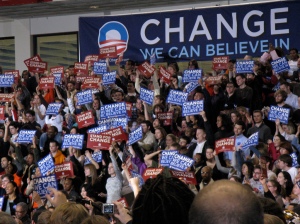So far, the 2008 presidential campaign has introduced a number of firsts to the American political arena. The more obvious ones are the sociological firsts: a black presidential nominee and the real possibility for a woman to become president. But these aren’t the only ones. Nor, are they the most substantial in terms of the immediate impact on the practice of politics and the strategy of running a campaign.
Sen. Barack Obama (D-Ill.) is the first presidential candidate to not rely on large donations from a few wealthy people to run his campaign. Obama was also the one of the first presidential candidates to have access to social networking tools. But, he was the first to take full advantage of the possibilities that these tools open up (not considering Dean’s work with MeetUp as taking full advantage; although, his tech world was not as developed). Combining these two firsts, Obama has created a dynamic campaign that people believe in and that people volunteer for and give money to. In June 2008, the Atlantic Online writes:
“The social-networking model provided Obama with something that insurgents before him, from Gary Hart to McCain, always lacked: a means of capturing excitement and translating it into money. In the 2004 primary, Howard Dean raised $27 million online. Obama is fast approaching $200 million.”
To this point, these new strategies have proven very successful for the Obama campaign. So much so, that it may be the new model for running a political campaign. Will future candidates focus on small donors as the fuel that powers their campaigns?
Well, the Obama model isn’t just the social networks. Yes, it makes it easier for people to donate money and to volunteer their time. But, there is a message at the core of the campaign that compels people to do those things. Without the ideas and passion behind all of the tools and great speeches, the campaign would not be as successful as it has been.
Therfore, Obama has not only raised the bar for campaign strategies, but he has also set a new standard for
honesty, purity, and passion in politics. In April 2007, The Washington Post quoted an Obama fundraiser when he said “It is the single easiest fundraising phone call that I have ever made, ever. In 25 years. Literally. For charity, politics, anything. It kind of blew me away; if i made 100 phone calls, 90 of them were successes.”
The above mentioned Atlantic article says, “But more than any policy, the idea of Obama and the world he speaks for seemed to excite something deep within the limbic system of the [Silicon] Valley brain that manifested itself through the early and continuing financial support that was crucial to launching Obama’s campaign.” Entrepreneurs and venture capitalists in Silicon Valley have been at the cornerstone of Obama’s support, both financially and technologically.
But it is precisely this, the idea of Obama and his proposals of change that excite people and compel them to give money and time to the campaign. So, in order for future campaigns to mimic what Obama has done, there needs to be a compelling reason for people to participate. This type of campaign is driven by millions of people. If there is no motivation for them, it will collapse.
As hard as it was to see Obama coming two years ago, it is equally difficult to see someone else with the ability to replicate Obama in 2012.
But, to be sure, a large determinant in this question won’t be answered until November 4th.

